Evaluating Individualism and Collectivism in Intercultural Business
VerifiedAdded on 2023/01/19
|7
|2334
|95
Report
AI Summary
This report provides an in-depth analysis of individualism and collectivism within an intercultural business context. It examines the contrasting views on how these cultural dimensions impact work dynamics, team performance, and overall organizational success. The report evaluates the positive and negative aspects of both individualism (emphasizing self-reliance and individual achievement) and collectivism (prioritizing group harmony and cooperation). It draws on various scholarly sources to illustrate how these differing approaches influence decision-making, risk-taking, conflict resolution, and employee relationships. The report concludes by highlighting the importance of a balanced approach, suggesting that effective management involves leveraging the strengths of both individual and collective efforts to achieve organizational goals. This report offers valuable insights for understanding and navigating the complexities of intercultural business environments.

Intercultural business in
management
management
Paraphrase This Document
Need a fresh take? Get an instant paraphrase of this document with our AI Paraphraser
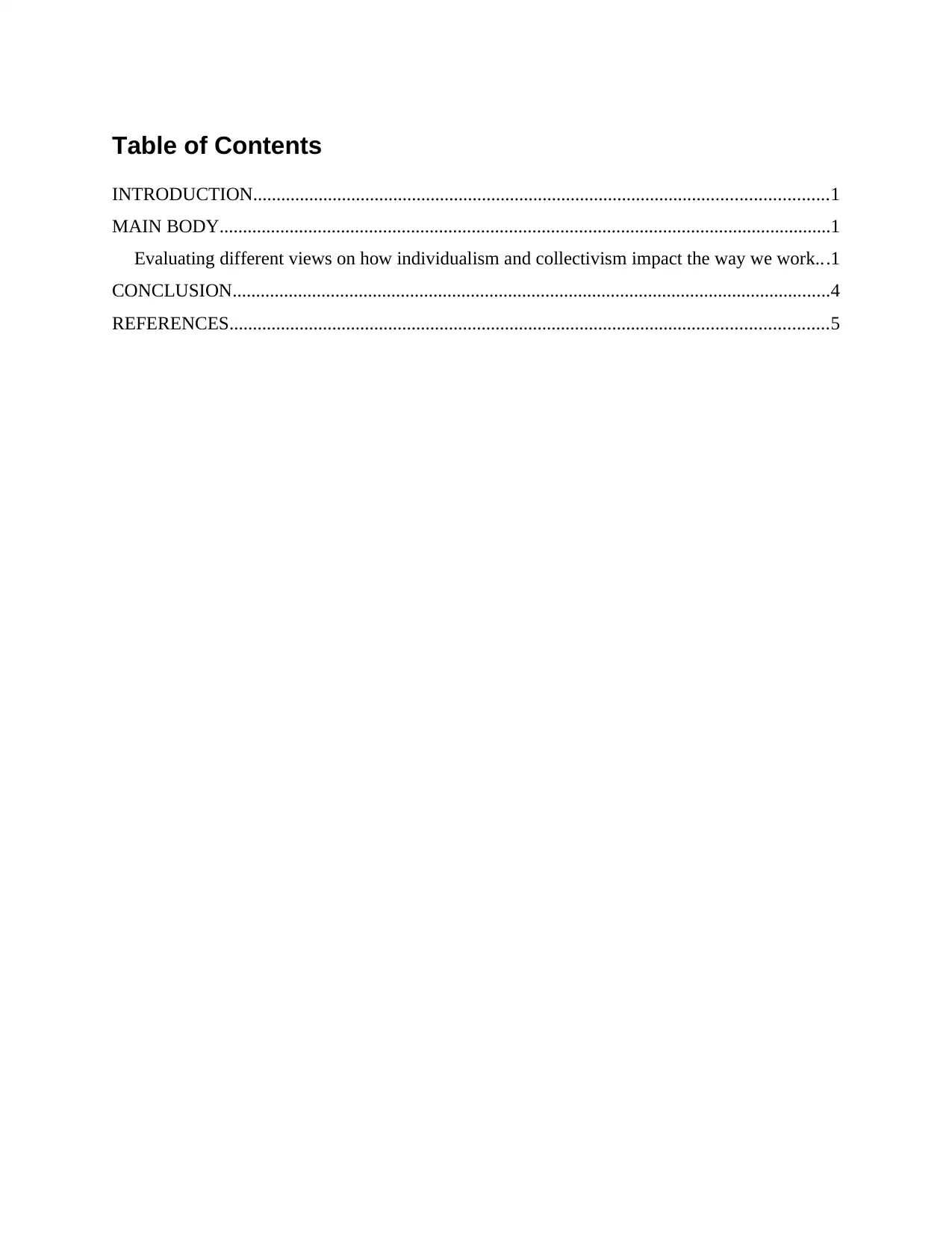
Table of Contents
INTRODUCTION...........................................................................................................................1
MAIN BODY...................................................................................................................................1
Evaluating different views on how individualism and collectivism impact the way we work...1
CONCLUSION................................................................................................................................4
REFERENCES................................................................................................................................5
INTRODUCTION...........................................................................................................................1
MAIN BODY...................................................................................................................................1
Evaluating different views on how individualism and collectivism impact the way we work...1
CONCLUSION................................................................................................................................4
REFERENCES................................................................................................................................5
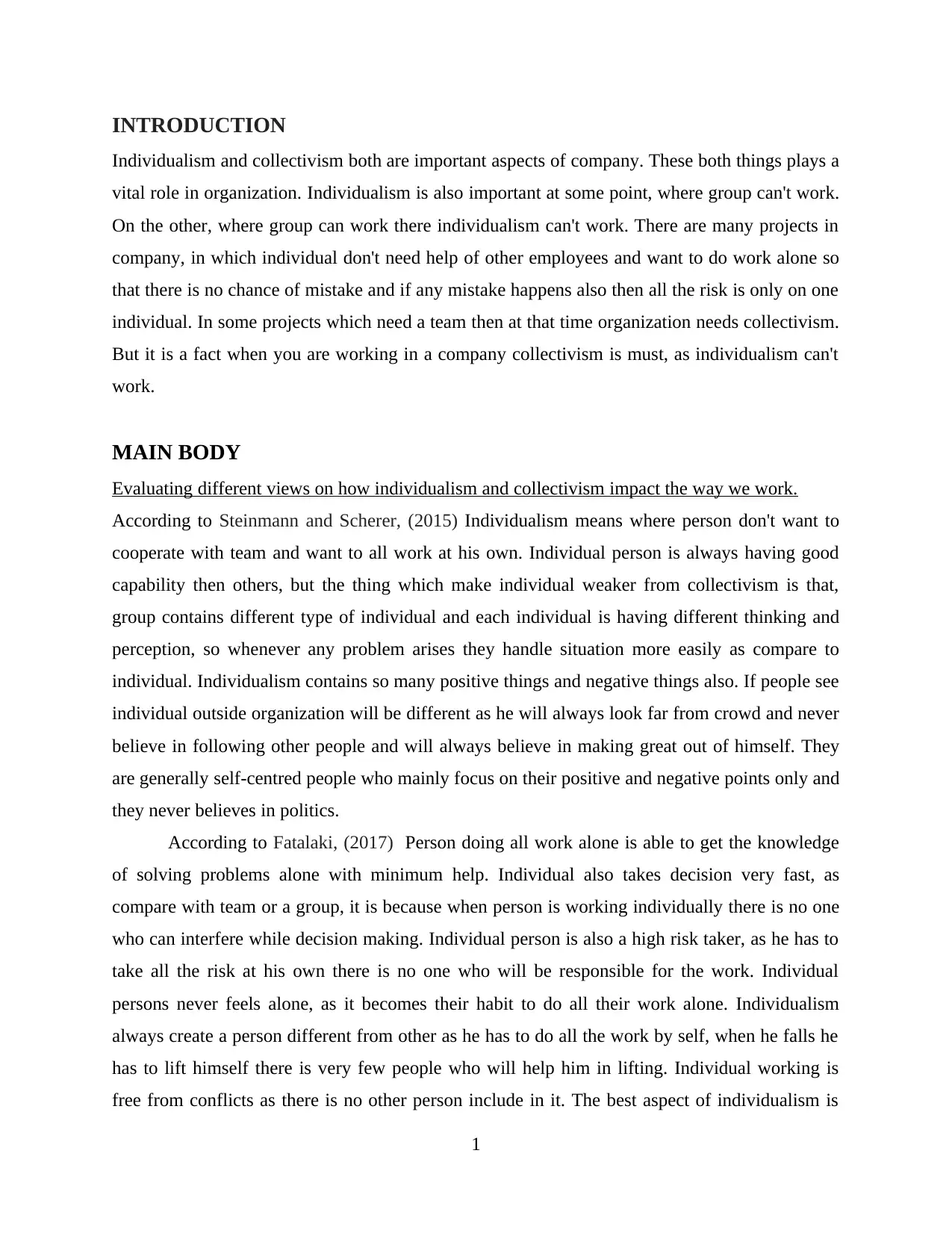
INTRODUCTION
Individualism and collectivism both are important aspects of company. These both things plays a
vital role in organization. Individualism is also important at some point, where group can't work.
On the other, where group can work there individualism can't work. There are many projects in
company, in which individual don't need help of other employees and want to do work alone so
that there is no chance of mistake and if any mistake happens also then all the risk is only on one
individual. In some projects which need a team then at that time organization needs collectivism.
But it is a fact when you are working in a company collectivism is must, as individualism can't
work.
MAIN BODY
Evaluating different views on how individualism and collectivism impact the way we work.
According to Steinmann and Scherer, (2015) Individualism means where person don't want to
cooperate with team and want to all work at his own. Individual person is always having good
capability then others, but the thing which make individual weaker from collectivism is that,
group contains different type of individual and each individual is having different thinking and
perception, so whenever any problem arises they handle situation more easily as compare to
individual. Individualism contains so many positive things and negative things also. If people see
individual outside organization will be different as he will always look far from crowd and never
believe in following other people and will always believe in making great out of himself. They
are generally self-centred people who mainly focus on their positive and negative points only and
they never believes in politics.
According to Fatalaki, (2017) Person doing all work alone is able to get the knowledge
of solving problems alone with minimum help. Individual also takes decision very fast, as
compare with team or a group, it is because when person is working individually there is no one
who can interfere while decision making. Individual person is also a high risk taker, as he has to
take all the risk at his own there is no one who will be responsible for the work. Individual
persons never feels alone, as it becomes their habit to do all their work alone. Individualism
always create a person different from other as he has to do all the work by self, when he falls he
has to lift himself there is very few people who will help him in lifting. Individual working is
free from conflicts as there is no other person include in it. The best aspect of individualism is
1
Individualism and collectivism both are important aspects of company. These both things plays a
vital role in organization. Individualism is also important at some point, where group can't work.
On the other, where group can work there individualism can't work. There are many projects in
company, in which individual don't need help of other employees and want to do work alone so
that there is no chance of mistake and if any mistake happens also then all the risk is only on one
individual. In some projects which need a team then at that time organization needs collectivism.
But it is a fact when you are working in a company collectivism is must, as individualism can't
work.
MAIN BODY
Evaluating different views on how individualism and collectivism impact the way we work.
According to Steinmann and Scherer, (2015) Individualism means where person don't want to
cooperate with team and want to all work at his own. Individual person is always having good
capability then others, but the thing which make individual weaker from collectivism is that,
group contains different type of individual and each individual is having different thinking and
perception, so whenever any problem arises they handle situation more easily as compare to
individual. Individualism contains so many positive things and negative things also. If people see
individual outside organization will be different as he will always look far from crowd and never
believe in following other people and will always believe in making great out of himself. They
are generally self-centred people who mainly focus on their positive and negative points only and
they never believes in politics.
According to Fatalaki, (2017) Person doing all work alone is able to get the knowledge
of solving problems alone with minimum help. Individual also takes decision very fast, as
compare with team or a group, it is because when person is working individually there is no one
who can interfere while decision making. Individual person is also a high risk taker, as he has to
take all the risk at his own there is no one who will be responsible for the work. Individual
persons never feels alone, as it becomes their habit to do all their work alone. Individualism
always create a person different from other as he has to do all the work by self, when he falls he
has to lift himself there is very few people who will help him in lifting. Individual working is
free from conflicts as there is no other person include in it. The best aspect of individualism is
1
⊘ This is a preview!⊘
Do you want full access?
Subscribe today to unlock all pages.

Trusted by 1+ million students worldwide
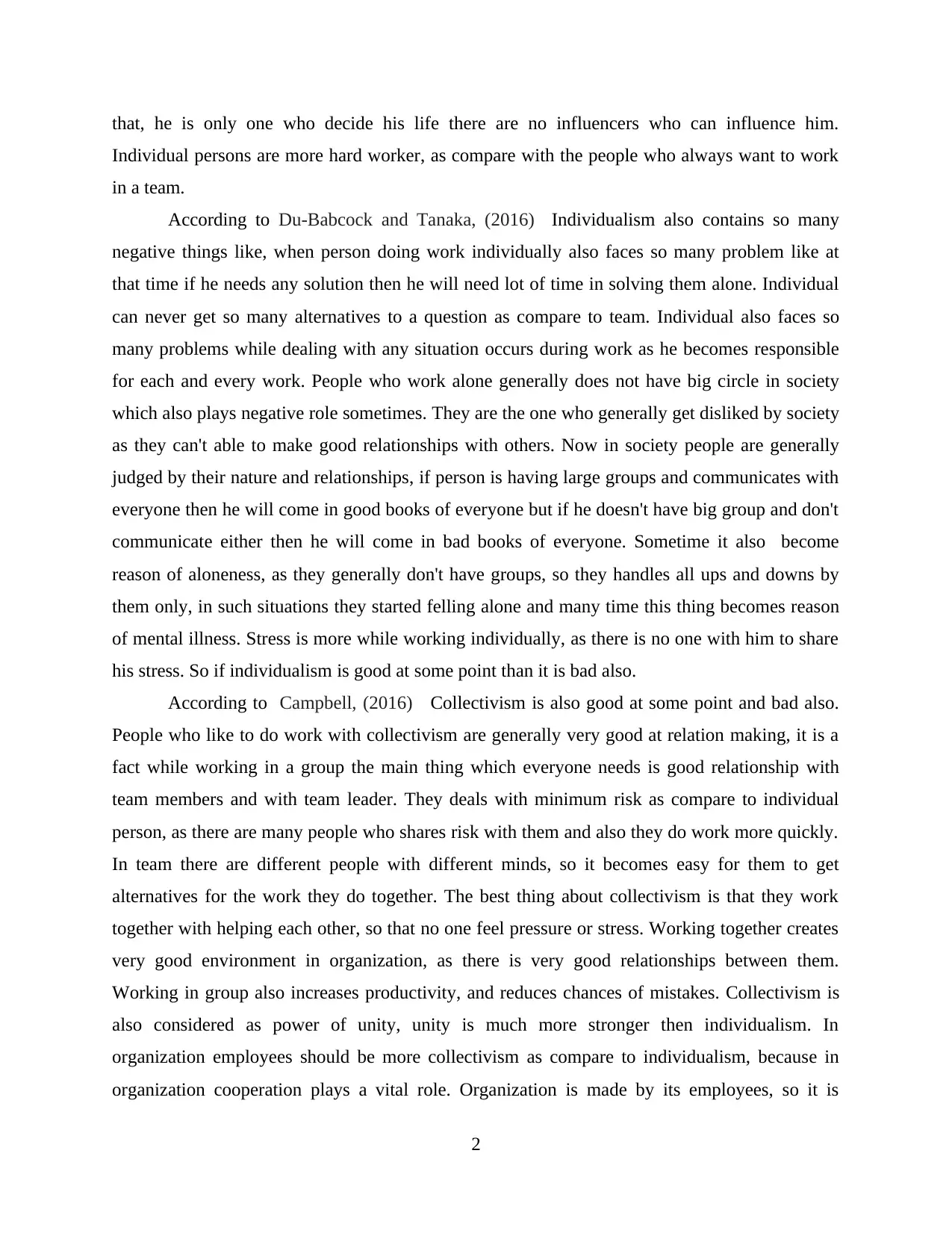
that, he is only one who decide his life there are no influencers who can influence him.
Individual persons are more hard worker, as compare with the people who always want to work
in a team.
According to Du-Babcock and Tanaka, (2016) Individualism also contains so many
negative things like, when person doing work individually also faces so many problem like at
that time if he needs any solution then he will need lot of time in solving them alone. Individual
can never get so many alternatives to a question as compare to team. Individual also faces so
many problems while dealing with any situation occurs during work as he becomes responsible
for each and every work. People who work alone generally does not have big circle in society
which also plays negative role sometimes. They are the one who generally get disliked by society
as they can't able to make good relationships with others. Now in society people are generally
judged by their nature and relationships, if person is having large groups and communicates with
everyone then he will come in good books of everyone but if he doesn't have big group and don't
communicate either then he will come in bad books of everyone. Sometime it also become
reason of aloneness, as they generally don't have groups, so they handles all ups and downs by
them only, in such situations they started felling alone and many time this thing becomes reason
of mental illness. Stress is more while working individually, as there is no one with him to share
his stress. So if individualism is good at some point than it is bad also.
According to Campbell, (2016) Collectivism is also good at some point and bad also.
People who like to do work with collectivism are generally very good at relation making, it is a
fact while working in a group the main thing which everyone needs is good relationship with
team members and with team leader. They deals with minimum risk as compare to individual
person, as there are many people who shares risk with them and also they do work more quickly.
In team there are different people with different minds, so it becomes easy for them to get
alternatives for the work they do together. The best thing about collectivism is that they work
together with helping each other, so that no one feel pressure or stress. Working together creates
very good environment in organization, as there is very good relationships between them.
Working in group also increases productivity, and reduces chances of mistakes. Collectivism is
also considered as power of unity, unity is much more stronger then individualism. In
organization employees should be more collectivism as compare to individualism, because in
organization cooperation plays a vital role. Organization is made by its employees, so it is
2
Individual persons are more hard worker, as compare with the people who always want to work
in a team.
According to Du-Babcock and Tanaka, (2016) Individualism also contains so many
negative things like, when person doing work individually also faces so many problem like at
that time if he needs any solution then he will need lot of time in solving them alone. Individual
can never get so many alternatives to a question as compare to team. Individual also faces so
many problems while dealing with any situation occurs during work as he becomes responsible
for each and every work. People who work alone generally does not have big circle in society
which also plays negative role sometimes. They are the one who generally get disliked by society
as they can't able to make good relationships with others. Now in society people are generally
judged by their nature and relationships, if person is having large groups and communicates with
everyone then he will come in good books of everyone but if he doesn't have big group and don't
communicate either then he will come in bad books of everyone. Sometime it also become
reason of aloneness, as they generally don't have groups, so they handles all ups and downs by
them only, in such situations they started felling alone and many time this thing becomes reason
of mental illness. Stress is more while working individually, as there is no one with him to share
his stress. So if individualism is good at some point than it is bad also.
According to Campbell, (2016) Collectivism is also good at some point and bad also.
People who like to do work with collectivism are generally very good at relation making, it is a
fact while working in a group the main thing which everyone needs is good relationship with
team members and with team leader. They deals with minimum risk as compare to individual
person, as there are many people who shares risk with them and also they do work more quickly.
In team there are different people with different minds, so it becomes easy for them to get
alternatives for the work they do together. The best thing about collectivism is that they work
together with helping each other, so that no one feel pressure or stress. Working together creates
very good environment in organization, as there is very good relationships between them.
Working in group also increases productivity, and reduces chances of mistakes. Collectivism is
also considered as power of unity, unity is much more stronger then individualism. In
organization employees should be more collectivism as compare to individualism, because in
organization cooperation plays a vital role. Organization is made by its employees, so it is
2
Paraphrase This Document
Need a fresh take? Get an instant paraphrase of this document with our AI Paraphraser
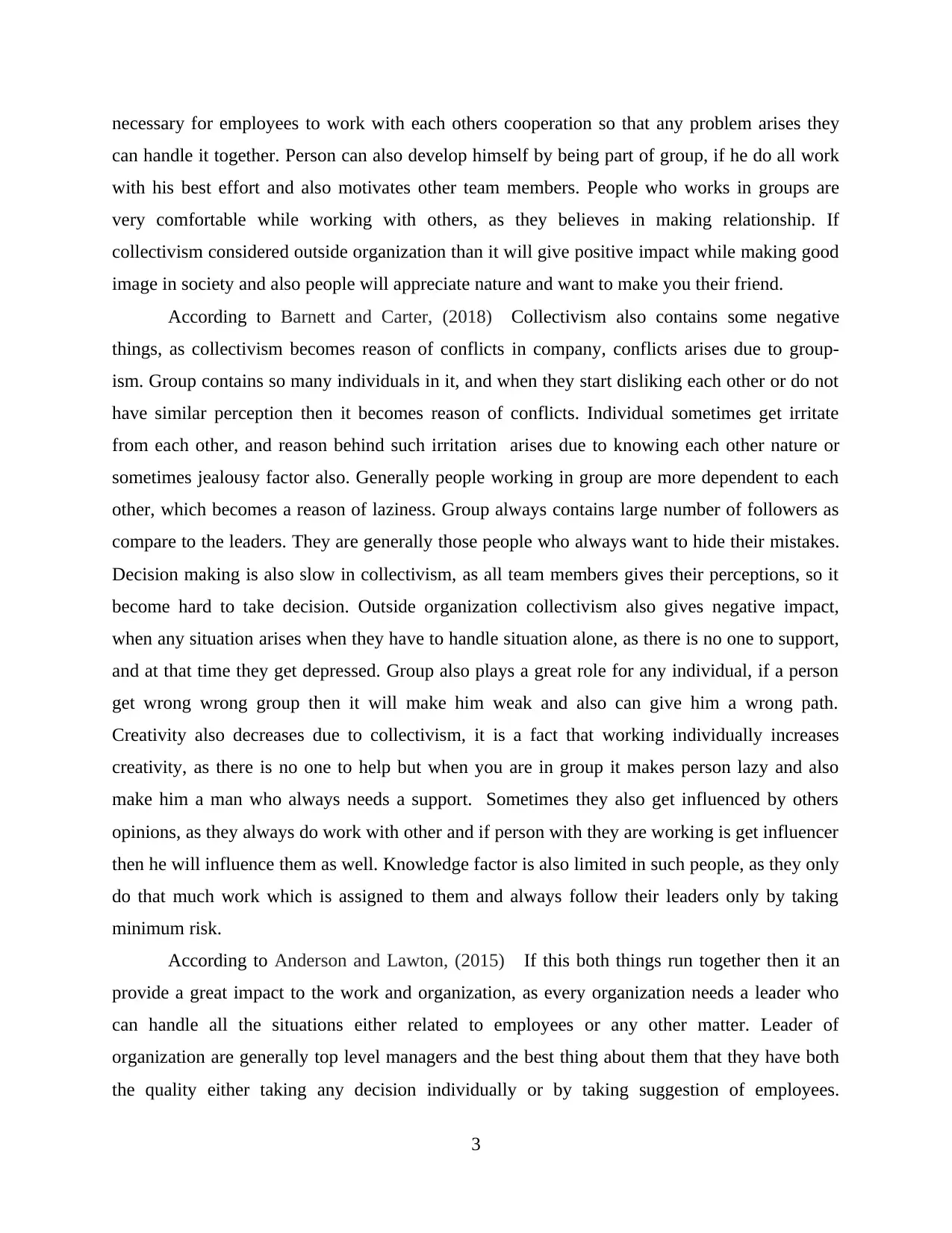
necessary for employees to work with each others cooperation so that any problem arises they
can handle it together. Person can also develop himself by being part of group, if he do all work
with his best effort and also motivates other team members. People who works in groups are
very comfortable while working with others, as they believes in making relationship. If
collectivism considered outside organization than it will give positive impact while making good
image in society and also people will appreciate nature and want to make you their friend.
According to Barnett and Carter, (2018) Collectivism also contains some negative
things, as collectivism becomes reason of conflicts in company, conflicts arises due to group-
ism. Group contains so many individuals in it, and when they start disliking each other or do not
have similar perception then it becomes reason of conflicts. Individual sometimes get irritate
from each other, and reason behind such irritation arises due to knowing each other nature or
sometimes jealousy factor also. Generally people working in group are more dependent to each
other, which becomes a reason of laziness. Group always contains large number of followers as
compare to the leaders. They are generally those people who always want to hide their mistakes.
Decision making is also slow in collectivism, as all team members gives their perceptions, so it
become hard to take decision. Outside organization collectivism also gives negative impact,
when any situation arises when they have to handle situation alone, as there is no one to support,
and at that time they get depressed. Group also plays a great role for any individual, if a person
get wrong wrong group then it will make him weak and also can give him a wrong path.
Creativity also decreases due to collectivism, it is a fact that working individually increases
creativity, as there is no one to help but when you are in group it makes person lazy and also
make him a man who always needs a support. Sometimes they also get influenced by others
opinions, as they always do work with other and if person with they are working is get influencer
then he will influence them as well. Knowledge factor is also limited in such people, as they only
do that much work which is assigned to them and always follow their leaders only by taking
minimum risk.
According to Anderson and Lawton, (2015) If this both things run together then it an
provide a great impact to the work and organization, as every organization needs a leader who
can handle all the situations either related to employees or any other matter. Leader of
organization are generally top level managers and the best thing about them that they have both
the quality either taking any decision individually or by taking suggestion of employees.
3
can handle it together. Person can also develop himself by being part of group, if he do all work
with his best effort and also motivates other team members. People who works in groups are
very comfortable while working with others, as they believes in making relationship. If
collectivism considered outside organization than it will give positive impact while making good
image in society and also people will appreciate nature and want to make you their friend.
According to Barnett and Carter, (2018) Collectivism also contains some negative
things, as collectivism becomes reason of conflicts in company, conflicts arises due to group-
ism. Group contains so many individuals in it, and when they start disliking each other or do not
have similar perception then it becomes reason of conflicts. Individual sometimes get irritate
from each other, and reason behind such irritation arises due to knowing each other nature or
sometimes jealousy factor also. Generally people working in group are more dependent to each
other, which becomes a reason of laziness. Group always contains large number of followers as
compare to the leaders. They are generally those people who always want to hide their mistakes.
Decision making is also slow in collectivism, as all team members gives their perceptions, so it
become hard to take decision. Outside organization collectivism also gives negative impact,
when any situation arises when they have to handle situation alone, as there is no one to support,
and at that time they get depressed. Group also plays a great role for any individual, if a person
get wrong wrong group then it will make him weak and also can give him a wrong path.
Creativity also decreases due to collectivism, it is a fact that working individually increases
creativity, as there is no one to help but when you are in group it makes person lazy and also
make him a man who always needs a support. Sometimes they also get influenced by others
opinions, as they always do work with other and if person with they are working is get influencer
then he will influence them as well. Knowledge factor is also limited in such people, as they only
do that much work which is assigned to them and always follow their leaders only by taking
minimum risk.
According to Anderson and Lawton, (2015) If this both things run together then it an
provide a great impact to the work and organization, as every organization needs a leader who
can handle all the situations either related to employees or any other matter. Leader of
organization are generally top level managers and the best thing about them that they have both
the quality either taking any decision individually or by taking suggestion of employees.
3
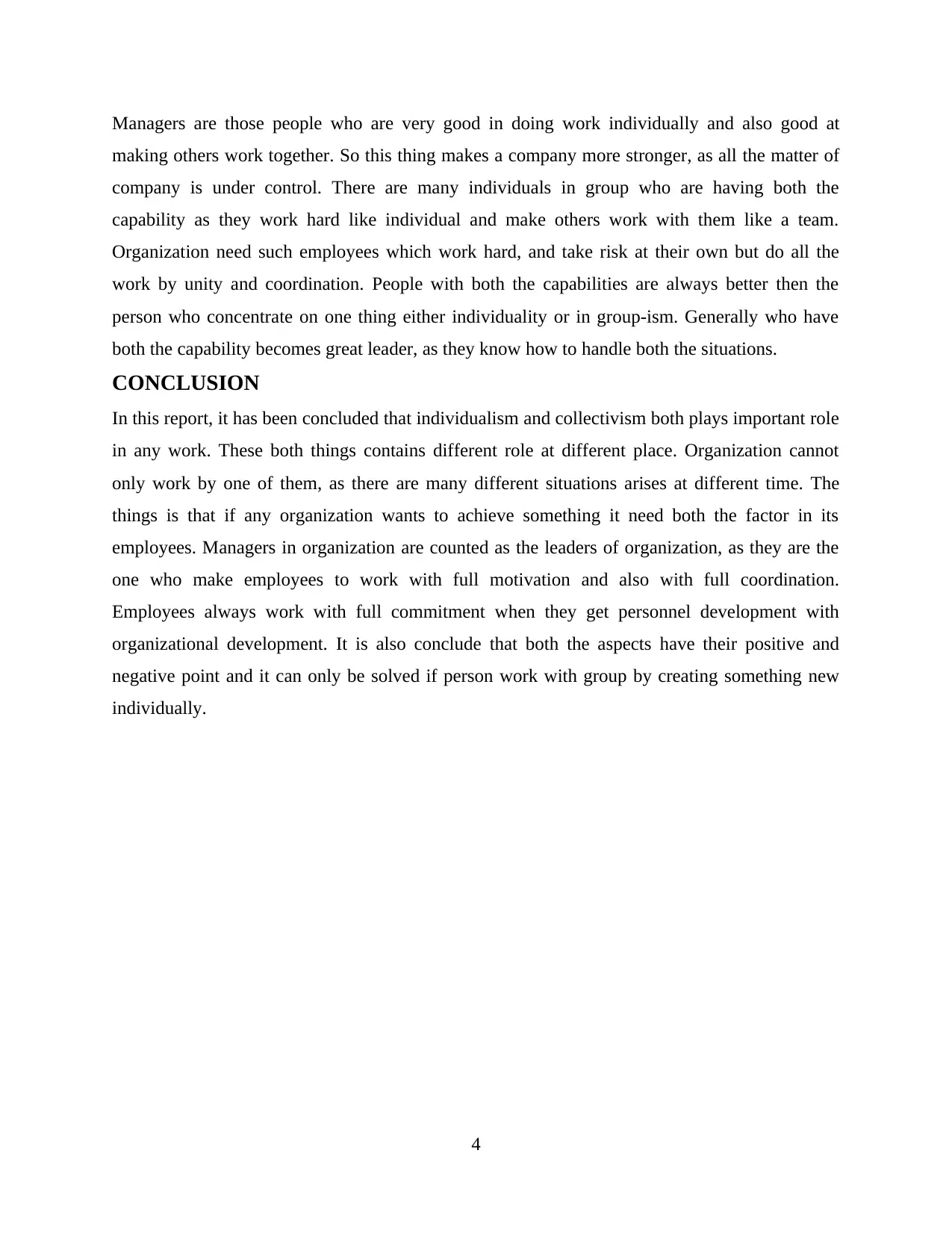
Managers are those people who are very good in doing work individually and also good at
making others work together. So this thing makes a company more stronger, as all the matter of
company is under control. There are many individuals in group who are having both the
capability as they work hard like individual and make others work with them like a team.
Organization need such employees which work hard, and take risk at their own but do all the
work by unity and coordination. People with both the capabilities are always better then the
person who concentrate on one thing either individuality or in group-ism. Generally who have
both the capability becomes great leader, as they know how to handle both the situations.
CONCLUSION
In this report, it has been concluded that individualism and collectivism both plays important role
in any work. These both things contains different role at different place. Organization cannot
only work by one of them, as there are many different situations arises at different time. The
things is that if any organization wants to achieve something it need both the factor in its
employees. Managers in organization are counted as the leaders of organization, as they are the
one who make employees to work with full motivation and also with full coordination.
Employees always work with full commitment when they get personnel development with
organizational development. It is also conclude that both the aspects have their positive and
negative point and it can only be solved if person work with group by creating something new
individually.
4
making others work together. So this thing makes a company more stronger, as all the matter of
company is under control. There are many individuals in group who are having both the
capability as they work hard like individual and make others work with them like a team.
Organization need such employees which work hard, and take risk at their own but do all the
work by unity and coordination. People with both the capabilities are always better then the
person who concentrate on one thing either individuality or in group-ism. Generally who have
both the capability becomes great leader, as they know how to handle both the situations.
CONCLUSION
In this report, it has been concluded that individualism and collectivism both plays important role
in any work. These both things contains different role at different place. Organization cannot
only work by one of them, as there are many different situations arises at different time. The
things is that if any organization wants to achieve something it need both the factor in its
employees. Managers in organization are counted as the leaders of organization, as they are the
one who make employees to work with full motivation and also with full coordination.
Employees always work with full commitment when they get personnel development with
organizational development. It is also conclude that both the aspects have their positive and
negative point and it can only be solved if person work with group by creating something new
individually.
4
⊘ This is a preview!⊘
Do you want full access?
Subscribe today to unlock all pages.

Trusted by 1+ million students worldwide
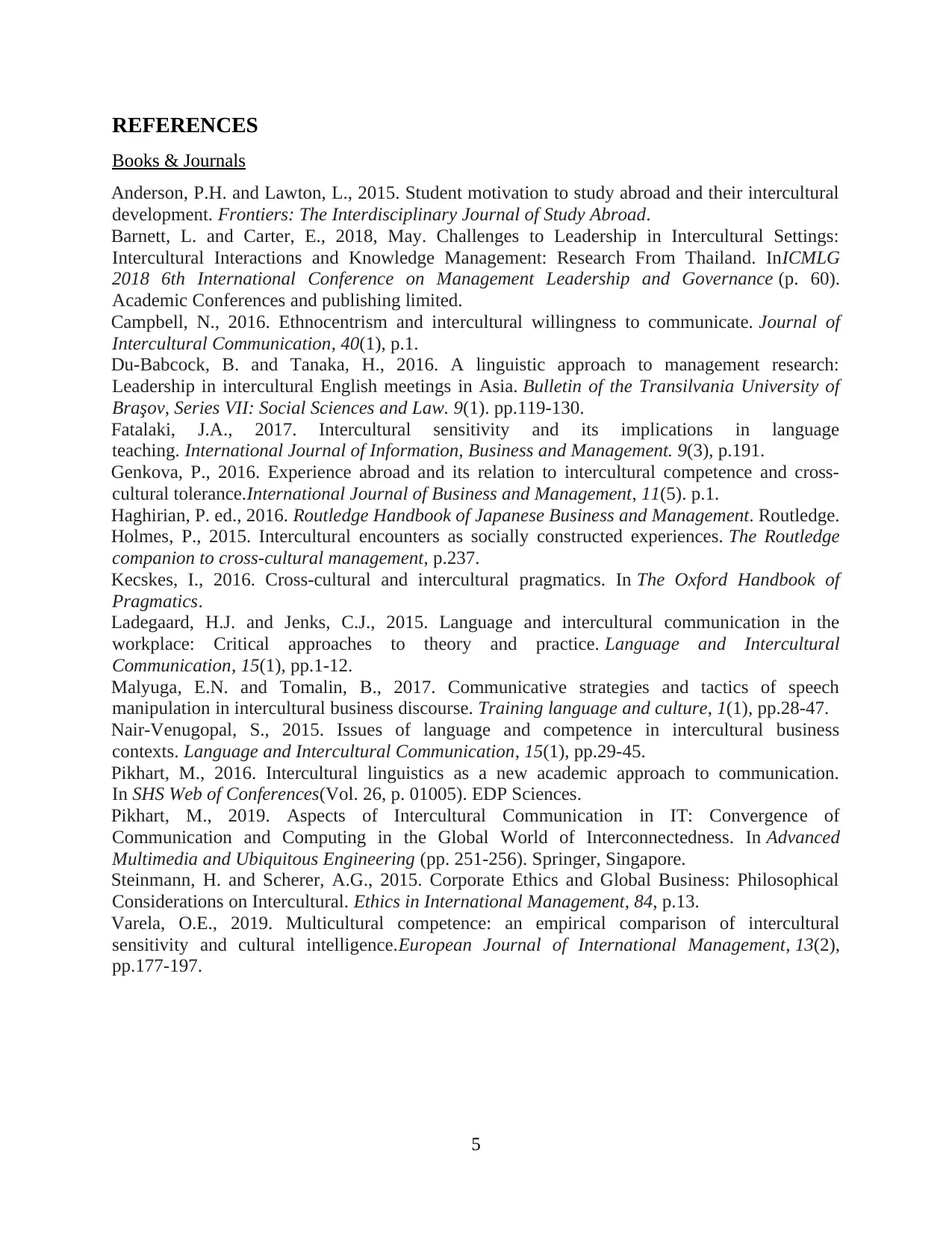
REFERENCES
Books & Journals
Anderson, P.H. and Lawton, L., 2015. Student motivation to study abroad and their intercultural
development. Frontiers: The Interdisciplinary Journal of Study Abroad.
Barnett, L. and Carter, E., 2018, May. Challenges to Leadership in Intercultural Settings:
Intercultural Interactions and Knowledge Management: Research From Thailand. InICMLG
2018 6th International Conference on Management Leadership and Governance (p. 60).
Academic Conferences and publishing limited.
Campbell, N., 2016. Ethnocentrism and intercultural willingness to communicate. Journal of
Intercultural Communication, 40(1), p.1.
Du-Babcock, B. and Tanaka, H., 2016. A linguistic approach to management research:
Leadership in intercultural English meetings in Asia. Bulletin of the Transilvania University of
Braşov, Series VII: Social Sciences and Law. 9(1). pp.119-130.
Fatalaki, J.A., 2017. Intercultural sensitivity and its implications in language
teaching. International Journal of Information, Business and Management. 9(3), p.191.
Genkova, P., 2016. Experience abroad and its relation to intercultural competence and cross-
cultural tolerance.International Journal of Business and Management, 11(5). p.1.
Haghirian, P. ed., 2016. Routledge Handbook of Japanese Business and Management. Routledge.
Holmes, P., 2015. Intercultural encounters as socially constructed experiences. The Routledge
companion to cross-cultural management, p.237.
Kecskes, I., 2016. Cross-cultural and intercultural pragmatics. In The Oxford Handbook of
Pragmatics.
Ladegaard, H.J. and Jenks, C.J., 2015. Language and intercultural communication in the
workplace: Critical approaches to theory and practice. Language and Intercultural
Communication, 15(1), pp.1-12.
Malyuga, E.N. and Tomalin, B., 2017. Communicative strategies and tactics of speech
manipulation in intercultural business discourse. Training language and culture, 1(1), pp.28-47.
Nair-Venugopal, S., 2015. Issues of language and competence in intercultural business
contexts. Language and Intercultural Communication, 15(1), pp.29-45.
Pikhart, M., 2016. Intercultural linguistics as a new academic approach to communication.
In SHS Web of Conferences(Vol. 26, p. 01005). EDP Sciences.
Pikhart, M., 2019. Aspects of Intercultural Communication in IT: Convergence of
Communication and Computing in the Global World of Interconnectedness. In Advanced
Multimedia and Ubiquitous Engineering (pp. 251-256). Springer, Singapore.
Steinmann, H. and Scherer, A.G., 2015. Corporate Ethics and Global Business: Philosophical
Considerations on Intercultural. Ethics in International Management, 84, p.13.
Varela, O.E., 2019. Multicultural competence: an empirical comparison of intercultural
sensitivity and cultural intelligence.European Journal of International Management, 13(2),
pp.177-197.
5
Books & Journals
Anderson, P.H. and Lawton, L., 2015. Student motivation to study abroad and their intercultural
development. Frontiers: The Interdisciplinary Journal of Study Abroad.
Barnett, L. and Carter, E., 2018, May. Challenges to Leadership in Intercultural Settings:
Intercultural Interactions and Knowledge Management: Research From Thailand. InICMLG
2018 6th International Conference on Management Leadership and Governance (p. 60).
Academic Conferences and publishing limited.
Campbell, N., 2016. Ethnocentrism and intercultural willingness to communicate. Journal of
Intercultural Communication, 40(1), p.1.
Du-Babcock, B. and Tanaka, H., 2016. A linguistic approach to management research:
Leadership in intercultural English meetings in Asia. Bulletin of the Transilvania University of
Braşov, Series VII: Social Sciences and Law. 9(1). pp.119-130.
Fatalaki, J.A., 2017. Intercultural sensitivity and its implications in language
teaching. International Journal of Information, Business and Management. 9(3), p.191.
Genkova, P., 2016. Experience abroad and its relation to intercultural competence and cross-
cultural tolerance.International Journal of Business and Management, 11(5). p.1.
Haghirian, P. ed., 2016. Routledge Handbook of Japanese Business and Management. Routledge.
Holmes, P., 2015. Intercultural encounters as socially constructed experiences. The Routledge
companion to cross-cultural management, p.237.
Kecskes, I., 2016. Cross-cultural and intercultural pragmatics. In The Oxford Handbook of
Pragmatics.
Ladegaard, H.J. and Jenks, C.J., 2015. Language and intercultural communication in the
workplace: Critical approaches to theory and practice. Language and Intercultural
Communication, 15(1), pp.1-12.
Malyuga, E.N. and Tomalin, B., 2017. Communicative strategies and tactics of speech
manipulation in intercultural business discourse. Training language and culture, 1(1), pp.28-47.
Nair-Venugopal, S., 2015. Issues of language and competence in intercultural business
contexts. Language and Intercultural Communication, 15(1), pp.29-45.
Pikhart, M., 2016. Intercultural linguistics as a new academic approach to communication.
In SHS Web of Conferences(Vol. 26, p. 01005). EDP Sciences.
Pikhart, M., 2019. Aspects of Intercultural Communication in IT: Convergence of
Communication and Computing in the Global World of Interconnectedness. In Advanced
Multimedia and Ubiquitous Engineering (pp. 251-256). Springer, Singapore.
Steinmann, H. and Scherer, A.G., 2015. Corporate Ethics and Global Business: Philosophical
Considerations on Intercultural. Ethics in International Management, 84, p.13.
Varela, O.E., 2019. Multicultural competence: an empirical comparison of intercultural
sensitivity and cultural intelligence.European Journal of International Management, 13(2),
pp.177-197.
5
1 out of 7
Related Documents
Your All-in-One AI-Powered Toolkit for Academic Success.
+13062052269
info@desklib.com
Available 24*7 on WhatsApp / Email
![[object Object]](/_next/static/media/star-bottom.7253800d.svg)
Unlock your academic potential
Copyright © 2020–2025 A2Z Services. All Rights Reserved. Developed and managed by ZUCOL.




